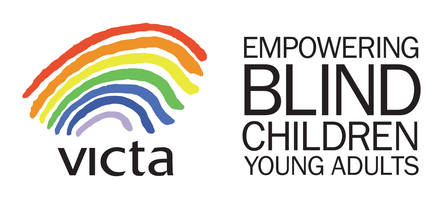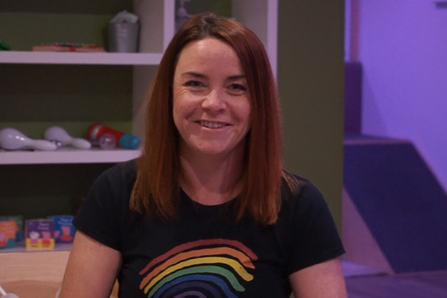
Blindness and the beauty of nature – a sensory partnership
That poses the very important question – if you are unable to see, how do you appreciate the beauty of nature?

A person who is vision impaired will access beauty in a multi-sensory way, placing emphasis on smells, tastes, touch, and sounds. They may not be able to see the warm red and orange tones of a setting sun, but they can sense the changes in the light conditions, they can feel the warmth of the sun against their face, and they can hear the collective bird song as they start to fly in murmuration. Beauty can be heard, felt, tasted, or smelt and this plays a very important factor in the way in which vision impaired people access nature.
VICTA has been working with The Wildlife Trusts and young people with vision impairments to help to provide opportunities for positive and therapeutic experiences in nature. This year we have a ‘Sensory Bingo’ resource included in the ‘30 Days Wild’ pack, which has been specially designed to be completed using all of the senses. This makes the challenge accessible to vision impaired individuals but is also inclusive to their sighted peers.
On a recent VICTA residential trip for blind and partially sighted 10 to 13 years olds, our group gave the sensory bingo a test run. The result was a lot of fun had exploring their surroundings in a more in-depth and considered way, discovering the textures of bark, fallen branches and as often the case in the UK, the sounds and feel of the rain!

Both VICTA and The Wildlife Trusts understand the importance of such activities to help create purposeful and meaningful interactions with nature that will help to reinforce positive childhood memories and improved mental and emotional wellbeing. Connecting with nature helps to develop both enjoyment of the environment and a sense of empathy for its many plants and wildlife. By building a familiarity with nature on the doorstep at a young age, we hope it will help young people grow in confidence to continue to engage with the world around them and in the future venture further afield.
We are so pleased to partner with The Wildlife Trusts on these accessible nature projects, to further strengthen the commitment of both organisations to dispelling the myth that appreciating the natural world is primarily a visual activity and promoting a multi-sensory ethos.
We really do hope that you enjoy completing the ‘Sensory Bingo’ challenge that is included in your ’30 Days Wild Pack’. It provides the perfect opportunity to think about the beauty of nature with your children and raise awareness of what it is like to have a vision impairment.
Please tag us @VICTAUK with your pictures of you taking part, we’d love to see you getting involved.
If you are the parent of a child with a vision impairment and would like to know more about how VICTA can support you, visit: www.victa.org.uk

Charlotte Mellor is the Projects and Programmes Administrator at VICTA, a national charity that works to empower blind and partially sighted children and their families. VICTA has been working with The Wildlife Trusts to strengthen accessibility within nature.

